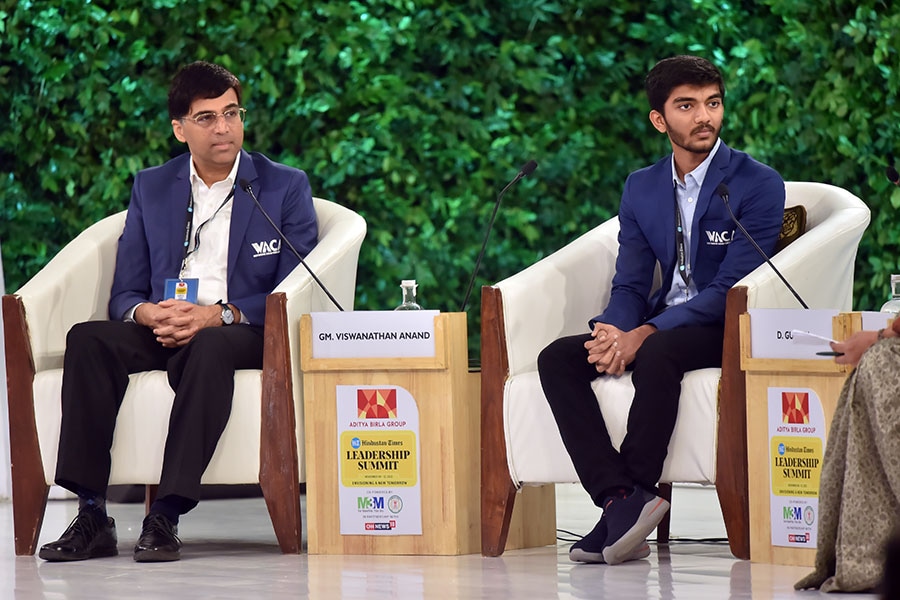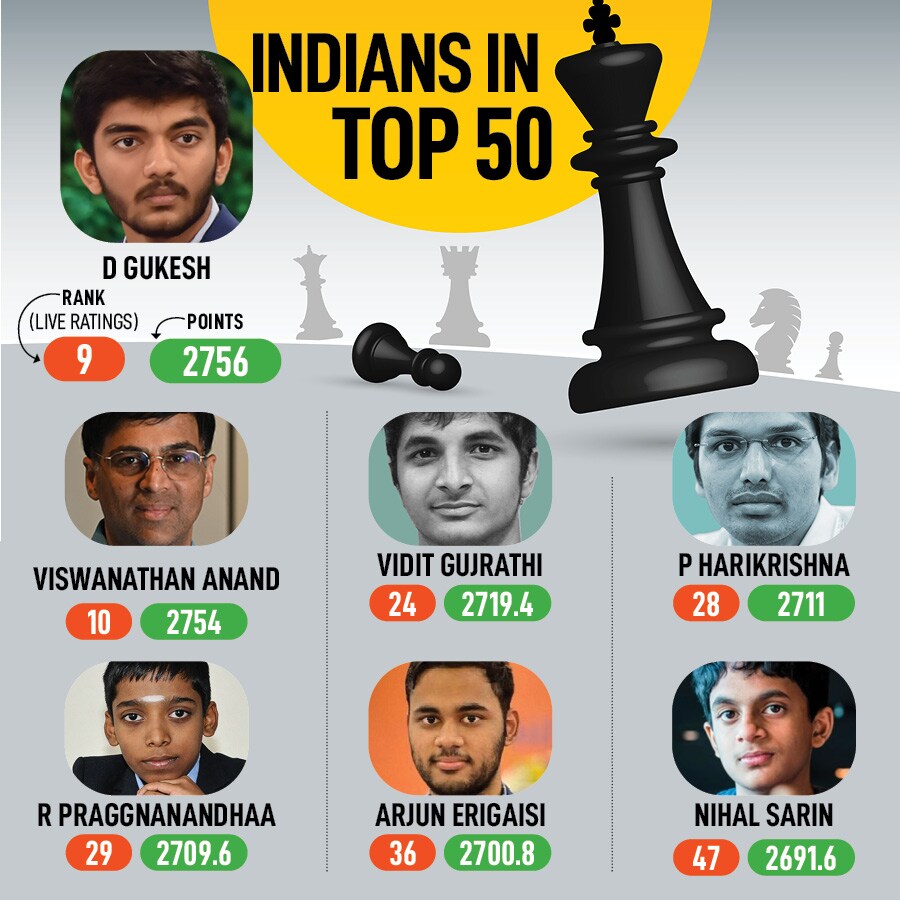
Explained: Gukesh topples Anand as top Indian chess player
By Kathakali Chanda| Aug 4, 2023
On Friday, the 17-year-old overtook India's chess pioneer as he went past Viswanathan Anand in the live ratings, ranking ninth, ahead of Anand at 10
 [CAPTION]Viswanathan Anand (left) and D Gukesh
Image: Raj K Raj/Hindustan Times via Getty Images [/CAPTION]
[CAPTION]Viswanathan Anand (left) and D Gukesh
Image: Raj K Raj/Hindustan Times via Getty Images [/CAPTION]
In 1988, eighteen years before D Gukesh was born, Viswanathan Anand became India’s first grandmaster. By the time he started playing chess as a seven-year-old, Anand was already a five-time world champion and one of the icons of the sport.
On Friday, the 17-year-old from Chennai overtook Anand in the live ratings of the International Chess Federation (FIDE), defeating Misratdin Iskandarov of Azerbaijan in a second-round match at the World Cup in Baku.
What This Means
In the classic format, Gukesh is now ranked ninth with 2,755.9 points, ahead of Anand at 10 with 2,754. When FIDE publishes its monthly ratings on September 1 (its live ratings being daily updates at the completion of the matches), still about a month away, the teenager is expected to make it to the top 10 in the world as the highest-rated Indian player._RSS_If that happens, it would be the first time in 36 years that Anand would be overtaken as India’s No. 1 chess player.
It is also only the second time that Anand has slid to the second spot in the live ratings behind another Indian—P Harikrishna had achieved the feat in 2016, but couldn’t hold on to his lead eventually.
Harikrishna is also among the seven Indians, along with Anand and Gukesh, to feature in the top 50 of FIDE’s live rankings.
Who Is D Gukesh
Gukesh, born to a microbiologist mother and an ENT surgeon father, became India’s youngest grandmaster, and the second youngest in the world (by 17 days), in 2019. His introduction to chess was almost fortuitous as his parents wanted to enrol him for an after-school activity, and were veering towards cricket, his first love. “But my wife knew that Gukesh had a phenomenal memory and could grasp concepts very easily. And it was she who suggested that instead of an outdoor sport we enrol him in chess,” his father had said in an interview to The Indian Express.
Gukesh is also the youngest player to have taken down World No. 1 Magnus Carlsen since he became world champion. In July, he became the youngest chess player to cross the 2,750-mark in Elo ratings, eclipsing Carlsen’s record by two months. Last year, the teenage prodigy was in red-hot form during the Chess Olympiad in Chennai, winning eight matches on the trot and helping India B bag the bronze medal. 
In Anand's Footsteps
While Gukesh has always been a promising player and dubbed a potential successor to Anand, his rise has been meteoric considering he broke into the top 100 only in April 2022. It’s perhaps no surprise that the youngster is mentored by Anand at the Westbridge Anand Chess Academy that the latter launched a few years ago to train aspiring GMs.
Last month, the protégé defeated the master at a Rapid Chess event in Zagreb, in a format that has been considered Anand’s fief over the years.
Also read: Indians no longer want to just play chess; they want to be the best: Viswanathan Anand
Anand lavished appreciation on his mentee in the run-up to the World Cup in Baku, when he told The Indian Express: “Over the last year and a half, Gukesh has convinced not only me but also many people of his talent. His dedication for chess is something that borders on fanaticism. I was convinced he has the potential. But now I’m seeing more and more in him the components he will need to stay at the top: Attitude, determination, willingness to experiment and take risks.”
India As A Powerhouse
Gukesh’s feat bears testimony to India’s rise as a chess powerhouse in the last three decades, going from Anand as its maiden grandmaster to 82 at the last count. The list includes the likes of R Praggnanandhaa, Arjun Erigaisi, Vidit Gujrathi and Nihal Sarin, who have frequently made headlines with their exploits. Praggnanandhaa, for instance, an 18-year-old from Chennai, has beaten Carlsen, a five-time world champion and considered to be among the most formidable grandmasters in recent times, three times in a row.
Anand had recalled in an earlier interview to Forbes India that when he started his chess academy, he wanted to work with GMs under the age of 14. “And there were already five of them,” he had said.
Carlsen also alluded to India’s prowess in the sport during the recent Global Chess League when he spoke about “the beginning of a revolution”. “I think it will only get better from here as India’s producing grandmasters more frequently than before,” he said. “There’s a lot to look forward to.”